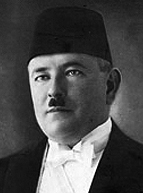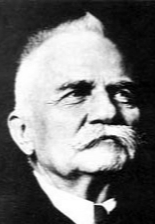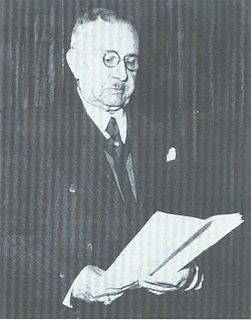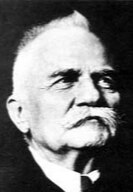
The Croatian Peasant Party is a centrist political party in Croatia founded on December 22, 1904 by Antun and Stjepan Radić as Croatian Peoples' Peasant Party (HPSS). Brothers Radić considered that the realization of Croatian statehood was possible within Austria-Hungary, but that it had to be reformed into a Monarchy divided into three equal parts – Austria, Hungary, Croatia. After the creation of Kingdom of Yugoslavia in 1918, Party requested for the Croatian part of the Kingdom to be based on self-determination. This brought them great public support which columned in 1920 parliamentary election when HPSS won all 58 seats assigned to Croatia.
This article gives an overview of liberalism in Croatia. It is limited to liberal parties with substantial support, mainly proved by having had a representation in parliament. The sign ⇒ denotes another party in that scheme. For inclusion in this scheme it isn't necessary so that parties labeled themselves as a liberal party.
This article gives an overview of liberalism in Slovenia. It is limited to liberal parties with substantial support, mainly proved by having had a representation in parliament. The sign ⇒ means a reference to another party in that scheme. For inclusion in this scheme it isn't necessary so that parties labeled themselves as a liberal party.

Mehmed Spaho was a Yugoslav politician and leader of the Yugoslav Muslim Organization. He was the first Bosnian Muslim politician in the Kingdom of Serbs, Croats and Slovenes. Spaho was described as the "undisputed leader of the Bosniaks between the two world wars" by the newspaper Oslobođenje in 2013. He died under mysterious circumstances in a Belgrade hotel.
The politics of Vojvodina function within the framework of the autonomous province of Vojvodina, Serbia. The province has a legislative assembly composed of 120 proportionally elected members, and a government composed of a president and cabinet ministers. The current political status of Vojvodina is regulated by the Statute of the Autonomous Province of Vojvodina from 2008.
The Democratic Alliance of Croats in Vojvodina is a minority political party of ethnic Croats in the Serbian province of Vojvodina, founded on July 15, 1990.

Constitutional Assembly elections were held in the Kingdom of Serbs, Croats and Slovenes on 18 March 1923. The seats were divided up by the political borders which existed before the Kingdom's formation and distributed using the population statistics of 1910.

Nikola Mandić was a Croatian politician who served as a Prime Minister of the Independent State of Croatia (NDH) during World War II. He was executed as a war criminal on 7 June 1945.
The Croatian Bunjevac-Šokac Party is a minority political party in the Serbian province of Vojvodina, formed in 2004. The aim of the party is to represent Croats from Bunjevac and Šokac communities.

The Croats of Serbia are the recognized Croat national minority in Serbia, a status they received in 2002. According to the 2011 census, there were 57,900 Croats in Serbia or 0.8% of the region's population. Of these, 47,033 lived in Vojvodina, where they formed the fourth largest ethnic group, representing 2.8% of the population. A further 7,752 lived in the national capital Belgrade, with the remaining 3,115 in the rest of the country.
The Temporary National Representation, also the Provisional Representation, was the first parliamentary body formed in the newly proclaimed Kingdom of Serbs, Croats and Slovenes. It convened on March 1, 1919. The representatives were selected by the Serbian National Assembly representing the Kingdom of Serbia and the National Council of Slovenes, Croats and Serbs representing the State of Slovenes, Croats and Serbs.
The Independent Democratic Party was a social liberal political party in the Kingdom of Serbs, Croats and Slovenes, and later the Kingdom of Yugoslavia. It was established by Svetozar Pribićević as a breakaway faction of the Democratic Party in 1924. It was formed by three different groups: by far the largest group were the Serbs from the areas of the former Austro-Hungarian Empire, that is Croatian, Bosnian and Vojvodina Serbs, with the prevalence of the first. The second most influential group were Slovene centralist liberals. The third group was composed by Croat liberals, mostly from Dalmatia and Zagreb.
The Vidovdan Constitution was the first constitution of the Kingdom of Serbs, Croats and Slovenes. It was approved by the Constitutional Assembly on 28 June 1921 despite the opposition boycotting the vote. The Constitution is named after the feast of St. Vitus (Vidovdan), a Serbian Orthodox holiday. The Constitution required a simple majority to pass. Out of 419 representatives, 223 voted for, 35 voted against and 161 abstained.
The Party of Rights was an influential Croatian political party in the 19th and 20th centuries. The right or rights in the party's name refer to the idea of Croatian national and ethnic rights, which was central to the party's ideology. Numerous modern Croatian and Bosnian Croat political parties claim lineage from it.
Serb Independent Party, also known as Serb Autonomous Party or simply Serb Autonomists, was an ethnic Serb political party in the Kingdom of Croatia-Slavonia, under the Austro-Hungarian Empire. It was established in August 1881, in Ruma, by Pavle Jovanović and other affluent Serbs. In 1903 Svetozar Pribićević (1875–1936) became the party leader. They published Srbobran, which was the party organ. The party advocated for the unification of Lika, Kordun, Banija, Dalmatia, Slavonia and Bosnia and Herzegovina with Serbia to form a Greater Serbia. It was later one of the key members of the Croat-Serb coalition.











